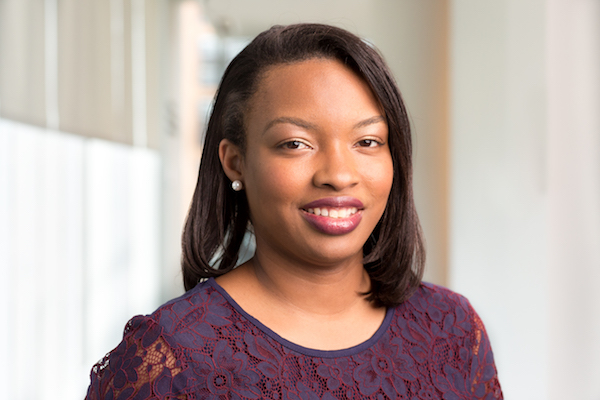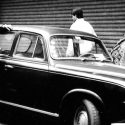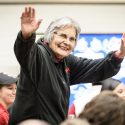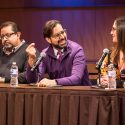Q & A: NPR’s Ayesha Rascoe on journalism, free time, and the day she won’t forget
Ayesha Rascoe reports on the White House for NPR. She’ll be on campus at the University of Wisconsin–Madison as the spring 2019 Public Affairs Journalist in Residence from Feb. 11-14. Before NPR, she was a journalist at Reuters and is a graduate of Howard University. At 5 p.m. on Monday, Feb. 11, Rascoe will give a public presentation titled “Criminal Justice Reform: What’s Next at the Federal Level?” The talk will be held in the DeLuca Forum of the Discovery Building, 330 N. Orchard.

“I hope that I helped the American public by sticking to the fundamentals of journalism,” says NPR’s Ayesha Rascoe. She is UW–Madison’s spring 2019 Public Affairs Journalist in Residence. Photo: Allison Shelley
Q: You covered one of the starkest shifts in American politics, the final year of the Obama presidency to the first years of Trump’s time in the White House. As a reporter, how did you help the American public understand that time of transition?
A: I hope that I helped the American public by sticking to the fundamentals of journalism. I tried to present the facts of what was happening and I tried to be transparent about what we knew and didn’t know. There are times when things have happened in the Trump White House and it’s been unprecedented, so you have to be clear that this is not how White Houses have typically functioned.
But there were adjustments by news organizations. In the past if the president said something as a fact, you automatically reported it. Now, outlets are much more careful about making clear that sometimes President Trump says things that are not backed up by evidence. It’s not a perfect system and different news outlets will land in different places about how to handle these kind of statements, but it’s definitely evolved.
Q: It’s hard to understand the meaning of a moment when you’re living it, but as a reporter, part of your job is to help people understand the significance and meaning of current events. What tools do you draw on to deliver on that responsibility?
A: I try to provide context and scope for whatever I’m reporting on. Is there data that I could use to give a sense of the historic nature of an event or a trend? Is there some way to illustrate how much things have changed or stayed the same? For example, I’ve dug through months of speeches from current and past presidents to compare language and travel. I try to find something tangible and measurable to move beyond talking points. But sometimes the best reporting is just a matter of describing a surreal incident as it unfolds, and the reality of the situation stands for itself.
Q: You’ve had a ringside seat to some historic moments in national politics. Do any memories of the past few years stick out in your mind, and make you think, “Wow, I was there”?
A: The biggest for me is the Helsinki summit with President Trump and Russian President Vladimir Putin last year. It was one for the history books. I will always remember being there the first time Trump and Putin addressed the public together and answered questions about whether Putin had any dirt on Trump. It was mind blowing. Before the news conference began, a journalist who planned to protest was forcefully escorted out of the room by security. It set a tone for the day, with everyone just really on edge. The mood and the atmosphere were really intense.
Q: What first made you want to pursue a career as a journalist?
A: I always loved to read and write, and history was my favorite subject growing up. When I was young, I was obsessed with music magazines and I was always reading my local newspaper. Then in middle school, I took an aptitude test and it said that journalism would be a good career field for me. I kind of took that and ran with it.
Q: What advice do you have for current students looking for careers in public policy and journalism?
A: Take advantage of every opportunity you can to report or produce news or to be in the room with professional journalists. Apply to all the fellowships, internships and seminars that you can just to soak up all the knowledge that you can get. It also helps if you’re interested in one area to really make yourself the expert in that subject. Develop an expertise that helps you to stand out in what can be a crowded field.
Q: After you pull an all-nighter covering a story, what’s your favorite way to recuperate when you have a free day?
A: I have very young children, so I don’t really get any free days. But I do love reality TV, so when I can I try to catch up on “Love and Hip Hop,” “Real Housewives of Atlanta” and shows like that. I’m also a huge “Game of Thrones” fan and love almost anything horror or super hero-related.
Q: What are you most looking forward to about your visit to Madison?
A: I believe this is my first trip to Wisconsin, so I’m looking forward to learning more about the state and about Madison. But the biggest thing I’m looking forward to is being able to talk with students and to hear their perspectives.



